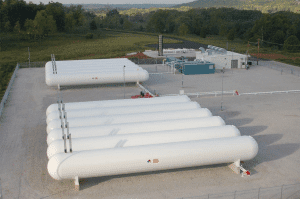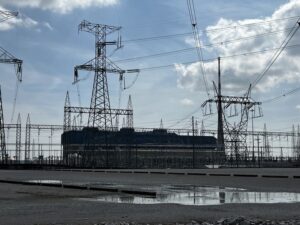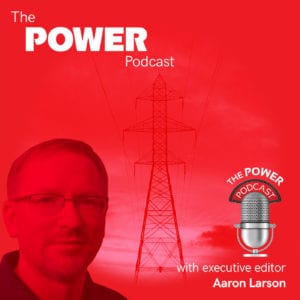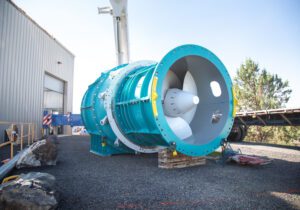POWER Podcasts
-
Gas
Reducing Carbon Intensity with Renewable Propane
Most propane used in the U.S. today is produced as a byproduct of natural gas processing and crude oil refining, which are not considered “green” technologies. However, renewable propane availability is growing. Renewable propane, like its conventional brother, is commonly made as a byproduct of other fuel production, in its case, often renewable diesel and […]
-
O&M
How Power Companies Benefit from Accurate Weather Forecasts
It’s pretty easy to understand how the weather affects certain forms of power generation and infrastructure. Sunlight is obviously needed to generate solar power, wind is required to produce wind energy, and extreme storms of all kinds can wreak havoc on transmission and distribution lines, and other energy-related assets. Therefore, having accurate and constantly updated […]
-
Legal & Regulatory
Environmental Justice: What It Is and Why It’s Important to Power Projects
The U.S. Department of Energy (DOE) defines environmental justice as: “The fair treatment and meaningful involvement of all people, regardless of race, color, national origin, or income, with respect to the development, implementation, and enforcement of environmental laws, regulations, and policies.” It says “fair treatment” means that no population bears a disproportionate share of negative […]
-
History
Power Grid Investments Improve Reliability and Make Blackouts Less Likely
While power outages are not uncommon in the U.S., widespread blackouts that last more than a couple of hours are pretty rare. However, this summer marks the 20th anniversary of one of the most significant blackouts in North American history. The incident didn’t just affect the U.S., but also major parts of Canada. The blackout […]
-
Electrification
Nuclear Power, Electrification, and Carbon-Free Fuel Are Key to INL Achieving Net-Zero by 2031
In 2021, Idaho National Laboratory (INL) Director John Wagner set a lofty goal for the lab to achieve net-zero carbon emissions within 10 years. An uninformed observer might think that would be an easy task for an organization as focused on energy as INL, but it’s important to recognize that the lab is spread over […]
-
Gas
CTOTF Conference: ‘Best One-Stop Shop to Hit It All’
The Combustion Turbine Operations Technical Forum (CTOTF) is the longest continuously active gas turbine industry organization driven by users, for users. CTOTF offers week-long conferences twice annually in the spring and fall. The conferences provide a balance of technical information, user-to-user interaction, and professional development and mentoring for the group’s nationwide user base. CTOTF’s 2023 […]
-
Hydrogen
Hydrogen Offers a ‘Multi-Billion-Dollar Opportunity’ This Decade for Innovative Companies
Hydrogen demand throughout the world reached 94 million metric tons in 2021, according to the International Energy Agency’s (IEA’s) Global Hydrogen Review 2022, an annual report issued by the IEA in late September last year. Demand for new applications grew to about 40,000 metric tons (up 60% from 2020, albeit from a low base). Notably, […]
-
Nuclear
How to Achieve a Thriving Nuclear Power Industry in the U.S.
There are many reasons to be excited about the U.S. nuclear power industry and its potential for growth. For activists focused on climate change, its carbon-free attribute makes it a viable long-term power resource. Additionally, its around-the-clock generating capability makes it a vital option in a world increasingly filled with intermittent renewables. Furthermore, new technology […]
-
Electric Vehicles
How Renewable Propane-Fueled EV Charging Solutions Can Significantly Cut Carbon Emissions
Calculating and comparing air emissions from electric vehicles (EVs) and gasoline- or diesel-fueled vehicles is a complicated endeavor. While EVs, including hybrids, produce lower tailpipe emissions than conventional vehicles do—and zero tailpipe emissions when running only on electricity—tailpipe emissions are only one factor to consider in a vehicle’s lifecycle emissions. Gasoline and electricity fuel pathways […]
-
Gas
POWER’s 2023 Plant of the Year: Estrella del Mar III
For more than four decades, POWER magazine has honored the top performers in the electricity-generating industry with annual power plant awards. Award winners are selected by the editors of POWER based on nominations submitted by industry insiders, including suppliers, designers, constructors, and operators of power plants. Winning POWER’s Plant of the Year in 2023 is […]
-
Nuclear
Subsequent License Renewal: Extending Nuclear Power Reactors to 80 Years of Operation (and Maybe More)
The Atomic Energy Act authorizes the Nuclear Regulatory Commission (NRC) to issue licenses for commercial power reactors to operate for up to 40 years. These licenses can be renewed for an additional 20 years at a time. The period after the initial licensing term is known as the period of extended operation. The decision to […]
-
Electrification
New Technology Offers Options for Floating Offshore Wind and Power-to-X Projects
New technology is regularly being developed and enhanced to improve power delivery and incorporate more renewable energy into systems. ABB Energy Industries is among the companies investing in solutions to make future power systems better. Among its current focus areas are deploying subsea power distribution and conversion concepts to support the floating offshore wind industry, […]
-
Environmental
How Propane Can Help Decarbonize the Power Grid
It’s no secret that leaders around the world are searching for ways to decarbonize their electric power grids. While solar panels and wind turbines have been the main options utilized in this effort in recent years, both are intermittent resources. Therefore, backup generation is required to keep power grids reliable. In many situations, that means […]
-
Energy Security
How an EMP or GMD Could Destroy the Power Grid and Create Chaos
Perhaps the most devastating thing that could happen in any developed country would be widespread catastrophic damage to its electric power grid. Nearly everything in an industrialized nation relies on electricity to function. Without it, normal water supplies, sewer systems, and communication services are cut off. Furthermore, things like food and transportation are quickly affected […]
-
Wind
Offshore Wind and Green Hydrogen Offer Great Opportunities for Gulf Coast States
The U.S. Gulf Coast offers some of the greatest potential for renewable energy development in the country. According to a National Renewable Energy Laboratory (NREL) study, Florida, Texas, and Louisiana rank second, third, and fourth, respectively, in net technical energy resource potential for offshore wind. The large energy resource in these three southern states is […]
-
Power
Henry Ford, J.P. Morgan, and FDR: Big Players in U.S. Hydropower History
When you study the history of hydropower, you expect to learn about people like British-American engineer James Francis, who developed the first modern hydro turbine in 1849. A testament to his genius is that the Francis turbine continues to be the most widely used water turbine in the world today. Or you assume American inventor […]
-
Power
Help Wanted: Retirements and the Energy Transition Lead to Job Openings in the Power Industry
It seems like industry insiders have been lamenting the aging power workforce for decades. Yet, there is still a large percentage of workers in the current workforce that are retirement eligible—some studies suggest the percentage is as high as 40%. Meanwhile, the energy transition has created a large number of new jobs building and operating […]
-
O&M
Cutting Costs with Technology-Driven Improvements
If you’ve been in the power industry workforce for any significant length of time, you may have asked your supervisor at some point “Why am I doing this?” regarding a task that you were assigned, only to have them respond, “We’ve always done it this way.” That’s because the power industry has a reputation for […]
-
Power
Is Delivering 100% Renewable Energy on an Hourly Basis at Cost-Competitive Rates Achievable?
Cynics might argue that it’s impossible to operate the power grid economically with 100% renewable energy on an hourly basis, but a model developed by Peninsula Clean Energy, a community choice aggregation agency that serves San Mateo County and the City of Los Banos, California, suggests it’s possible—at least in its little slice of the […]
-
POWER Podcasts
The POWER Podcast Archive Vol. 5
The POWER Podcast is available through Apple Podcasts, Spotify, YouTube, YouTube Music, Amazon Music, iHeart, TuneIn, SoundCloud, and some other podcast apps. Follow the links below to subscribe via your favorite platform: Apple Podcasts Spotify YouTube YouTube Music Amazon Music iHeart TuneIn SoundCloud The POWER Podcast Archive (Nov. 11, 2021 – Nov. 16, 2022) Fish […]
-
Hydro
Fish Friendly Hydro: Natel Energy Is Proving It’s Possible
Hydropower projects frequently face resistance from environmental groups for a variety of reasons. One of the more common objections to hydro is the high turbine-induced mortality of fish. The passage of fish through hydroelectric turbines can quickly prove fatal—a danger that increases with the size of the fish. Furthermore, if several hydropower plants are located […]
-
Power
How Rural Communities Can Benefit from the Energy Transition
Economic development can be a challenge for leaders in rural communities. Often, it’s hard to attract businesses to rural areas because the local workforce may not have the skills or numbers required to meet companies’ needs. But opportunities that haven’t been widely available in the past exist today for rural communities due to the energy […]
-
Management
A Pillar in the Community and Collaborator Around the World: DLC Powers Pittsburgh
The Duquesne Light Co. (DLC) may not be among the best-known electric power companies in the U.S., but for its customers in Allegheny and Beaver counties in southwestern Pennsylvania, the company has been a steady presence in the community for more than a century. “We are a Pittsburgh-based utility company. We’ve been in operation for […]
-
Business
How Bitcoin Mining Can Help Power Companies Optimize Generation Assets
Bitcoin mining is the process used to generate new coins and verify new transactions. The process involves vast, decentralized networks of computers around the world that verify and secure blockchains, the virtual ledgers that document cryptocurrency transactions. In return for contributing their computing power, miners are rewarded with new coins. The process ultimately requires a […]
-
Gas
Four Important Ways Aero-Derivative Gas Turbines Are Being Utilized in Power Systems
Aero-derivative gas turbines are widely used in the power industry. As the name implies, aero-derivative gas turbines evolved from innovations to proven technologies used in airplane jet engines. These gas turbines provide anywhere from 30 MW to 140 MW of efficient, reliable power, and deliver operational savings to energy providers worldwide. According to Harsh Shah, […]
-
Gas
The Energy Conundrum: Decarbonizing the Power Supply While Maintaining Reliable and Affordable Electricity
Countries throughout the world have set carbon emission reduction targets in an effort to limit the effects of climate change. Many are striving to achieve net zero in coming decades. Yet, governments also want to maintain, or even improve, living standards for their citizens, which means keeping power affordable and reliable. This poses some potentially […]
-
Wind
How to Overcome Challenges to the U.S.’s Offshore Wind Energy Goals
Lofty goals have been established in the U.S. for the offshore wind industry. The U.S. Department of Energy, Department of the Interior, and Department of Commerce announced a national goal in March 2021 to deploy 30 GW of offshore wind capacity by 2030. That would mark a significant increase from the 42 MW of offshore […]
-
Renewables
Community Choice Aggregation Provides Renewable Energy at Reduced Costs
Community Choice Aggregation (CCA) programs have become quite prominent in communities across California, and have begun to spring up in other states including Illinois, Massachusetts, and Ohio. Through CCA, communities can purchase electricity on behalf of residents and businesses, in place of investor-owned utilities such as Pacific Gas & Electric (PG&E), San Diego Gas & […]
-
Hydrogen
Hydrogen Poised to Play Prominent Role in the World’s Energy Transition
People around the world are searching for ways to decarbonize, and green hydrogen is a fuel that can help in that effort. Green hydrogen is produced through electrolysis using renewable energy, such as wind and solar power. Although most hydrogen produced today is made from natural gas, often referred to as gray hydrogen, new capacity […]
-
Coal
Keeping Coal Relevant: University of Wyoming Leads the Way
To say the coal industry faces challenges is an understatement. Coal-fired power plants are being retired around the globe as efforts to decarbonize the world’s power supply have intensified due to climate change concerns. That’s a problem for people working in the coal industry, as well as for states and governments that rely on coal […]





























